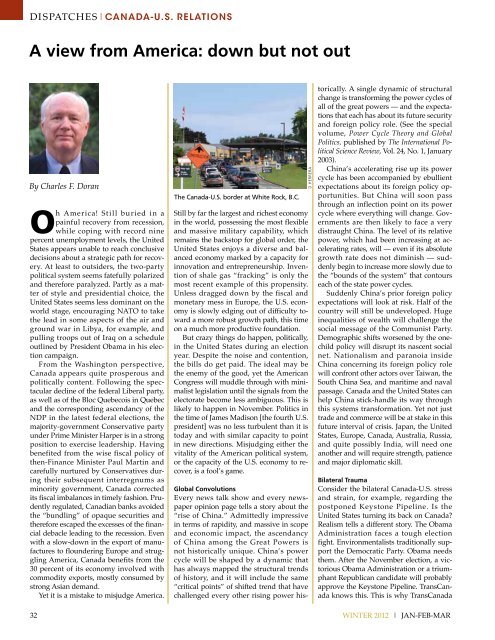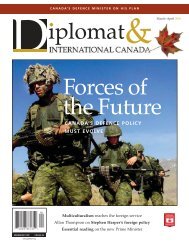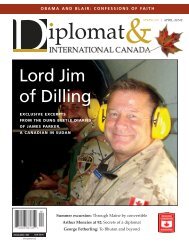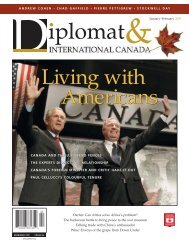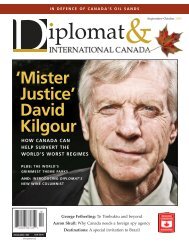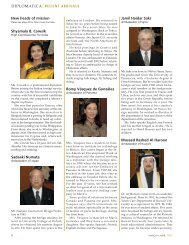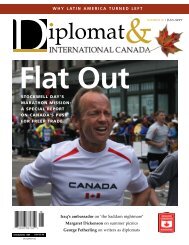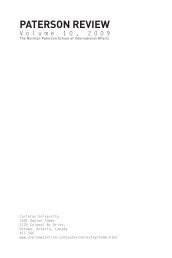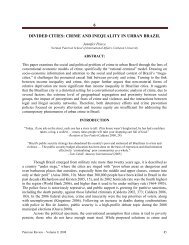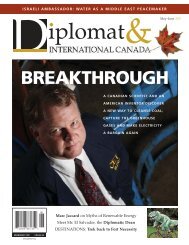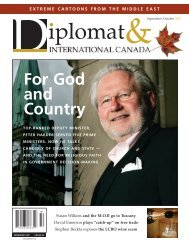John Baird: Canada's freedom agenda - Diplomat Magazine
John Baird: Canada's freedom agenda - Diplomat Magazine
John Baird: Canada's freedom agenda - Diplomat Magazine
You also want an ePaper? Increase the reach of your titles
YUMPU automatically turns print PDFs into web optimized ePapers that Google loves.
Di spatches|Canada-U.S. relationsA view from America: down but not outBy Charles F. DoranOh America! Still buried in apainful recovery from recession,while coping with record ninepercent unemployment levels, the UnitedStates appears unable to reach conclusivedecisions about a strategic path for recovery.At least to outsiders, the two-partypolitical system seems fatefully polarizedand therefore paralyzed. Partly as a matterof style and presidential choice, theUnited States seems less dominant on theworld stage, encouraging NATO to takethe lead in some aspects of the air andground war in Libya, for example, andpulling troops out of Iraq on a scheduleoutlined by President Obama in his electioncampaign.From the Washington perspective,Canada appears quite prosperous andpolitically content. Following the spectaculardecline of the federal Liberal party,as well as of the Bloc Quebecois in Quebecand the corresponding ascendancy of theNDP in the latest federal elections, themajority-government Conservative partyunder Prime Minister Harper is in a strongposition to exercise leadership. Havingbenefited from the wise fiscal policy ofthen-Finance Minister Paul Martin andcarefully nurtured by Conservatives duringtheir subsequent interregnums asminority government, Canada correctedits fiscal imbalances in timely fashion. Prudentlyregulated, Canadian banks avoidedthe “bundling” of opaque securities andtherefore escaped the excesses of the financialdebacle leading to the recession. Evenwith a slow-down in the export of manufacturesto floundering Europe and strugglingAmerica, Canada benefits from the30 percent of its economy involved withcommodity exports, mostly consumed bystrong Asian demand.Yet it is a mistake to misjudge America.The Canada-U.S. border at White Rock, B.C.Still by far the largest and richest economyin the world, possessing the most flexibleand massive military capability, whichremains the backstop for global order, theUnited States enjoys a diverse and balancedeconomy marked by a capacity forinnovation and entrepreneurship. Inventionof shale gas “fracking” is only themost recent example of this propensity.Unless dragged down by the fiscal andmonetary mess in Europe, the U.S. economyis slowly edging out of difficulty towarda more robust growth path, this timeon a much more productive foundation.But crazy things do happen, politically,in the United States during an electionyear. Despite the noise and contention,the bills do get paid. The ideal may bethe enemy of the good, yet the AmericanCongress will muddle through with minimalistlegislation until the signals from theelectorate become less ambiguous. This islikely to happen in November. Politics inthe time of James Madison [the fourth U.S.president] was no less turbulent than it istoday and with similar capacity to pointin new directions. Misjudging either thevitality of the American political system,or the capacity of the U.S. economy to recover,is a fool’s game.D HerreraGlobal ConvolutionsEvery news talk show and every newspaperopinion page tells a story about the“rise of China.” Admittedly impressivein terms of rapidity, and massive in scopeand economic impact, the ascendancyof China among the Great Powers isnot historically unique. China’s powercycle will be shaped by a dynamic thathas always mapped the structural trendsof history, and it will include the same“critical points” of shifted trend that havechallenged every other rising power historically.A single dynamic of structuralchange is transforming the power cycles ofall of the great powers — and the expectationsthat each has about its future securityand foreign policy role. (See the specialvolume, Power Cycle Theory and GlobalPolitics, published by The International PoliticalScience Review, Vol. 24, No. 1, January2003).China’s accelerating rise up its powercycle has been accompanied by ebullientexpectations about its foreign policy opportunities.But China will soon passthrough an inflection point on its powercycle where everything will change. Governmentsare then likely to face a verydistraught China. The level of its relativepower, which had been increasing at acceleratingrates, will — even if its absolutegrowth rate does not diminish — suddenlybegin to increase more slowly due tothe “bounds of the system” that contourseach of the state power cycles.Suddenly China’s prior foreign policyexpectations will look at risk. Half of thecountry will still be undeveloped. Hugeinequalities of wealth will challenge thesocial message of the Communist Party.Demographic shifts worsened by the onechildpolicy will disrupt its nascent socialnet. Nationalism and paranoia insideChina concerning its foreign policy rolewill confront other actors over Taiwan, theSouth China Sea, and maritime and navalpassage. Canada and the United States canhelp China stick-handle its way throughthis systems transformation. Yet not justtrade and commerce will be at stake in thisfuture interval of crisis. Japan, the UnitedStates, Europe, Canada, Australia, Russia,and quite possibly India, will need oneanother and will require strength, patienceand major diplomatic skill.Bilateral TraumaConsider the bilateral Canada-U.S. stressand strain, for example, regarding thepostponed Keystone Pipeline. Is theUnited States turning its back on Canada?Realism tells a different story. The ObamaAdministration faces a tough electionfight. Environmentalists traditionally supportthe Democratic Party. Obama needsthem. After the November election, a victoriousObama Administration or a triumphantRepublican candidate will probablyapprove the Keystone Pipeline. TransCanadaknows this. This is why TransCanada32 WINTER 2012 | JAN-FEB-MAR


